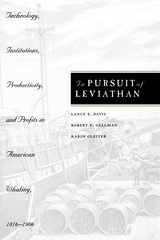
Hobbes's Leviathan, Hegel's Phenomenology of Spirit, and Heidegger's Being and Time dramatize conscience's relation to language and knowledge, morality and duty, and ontology. Feldman investigates how, within these works, conscience is described as binding upon us while at the same time asking how texts themselves may be read as binding.

Providing a wealth of historical information, In Pursuit of Leviathan is a classic industry study that will provide intriguing reading for anyone interested in the history of whaling.


Winner of the Scribes Book Award
“As brilliantly imaginative as it is urgently timely.”
—Richard H. Fallon, Jr., Harvard Law School
“At no time more than the present, a defense of expertise-based governance and administration is sorely needed, and this book provides it with gusto.”
—Frederick Schauer, author of The Proof
A highly original framework for restoring confidence in a government bureaucracy increasingly derided as “the deep state.”
Is the modern administrative state illegitimate? Unconstitutional? Unaccountable? Dangerous? America has long been divided over these questions, but the debate has recently taken on more urgency and spilled into the streets. Cass Sunstein and Adrian Vermeule argue that the administrative state can be redeemed so long as public officials are constrained by morality and guided by stable rules. Officials should make clear rules, ensure transparency, and never abuse retroactivity, so that current guidelines are not under constant threat of change. They should make rules that are understandable and avoid issuing contradictory ones.
These principles may seem simple, but they have a great deal of power. Already, they limit the activities of administrative agencies every day. In more robust form, they could address some of the concerns of critics who decry the “deep state” and yearn for its downfall.
“Has something to offer both critics and supporters…a valuable contribution to the ongoing debate over the constitutionality of the modern state.”
—Review of Politics
“The authors freely admit that the administrative state is not perfect. But, they contend, it is far better than its critics allow.”
—Wall Street Journal

“Carl Schmitt is surely the most controversial German political and legal philosopher of this century. . . . We deal with Schmitt, against all odds, because history stubbornly persists in proving many of his tenets right.”—Perspectives on Political Science
“[A] significant contribution. . . . The relation between Hobbes and Schmitt is one of the most important questions surrounding Schmitt: it includes a distinct, though occasionally vacillating, personal identification as well as an association of ideas.”—Telos

James Buchanan offers a strikingly innovative approach to a pervasive problem of social philosophy. The problem is one of the classic paradoxes concerning man's freedom in society: in order to protect individual freedom, the state must restrict each person's right to act. Employing the techniques of modern economic analysis, Professor Buchanan reveals the conceptual basis of an individual's social rights by examining the evolution and development of these rights out of presocial conditions.

The wave of liberalization that swept world markets in the 1980s and 90s altered the ways that governments manage their economies. Reinventing State Capitalism analyzes the rise of new species of state capitalism in which governments interact with private investors either as majority or minority shareholders in publicly-traded corporations or as financial backers of purely private firms (the so-called “national champions”). Focusing on a detailed quantitative assessment of Brazil’s economic performance from 1976 to 2009, Aldo Musacchio and Sergio Lazzarini examine how these models of state capitalism influence corporate investment and performance.
According to one model, the state acts as a majority investor, granting the state-owned enterprise (SOE) financial autonomy and allowing professional management. This form, the authors argue, has reduced many agency problems commonly faced by state ownership. According to another hybrid model, the state uses sovereign wealth funds, holding companies, and development banks to acquire a small share of equity ownership in a corporation, thereby potentially alleviating capital constraints and leveraging latent capabilities.
Both models have benefits and costs. Yet neither model has entirely eliminated the temptation of governments to intervene in the operation of natural resource industries and other large strategic enterprises. Nevertheless, the longstanding debate over whether private ownership is superior or inferior to state capitalism has become irrelevant, Musacchio and Lazzarini conclude. Private ownership is now mingled with state capital on a global scale.
READERS
Browse our collection.
PUBLISHERS
See BiblioVault's publisher services.
STUDENT SERVICES
Files for college accessibility offices.
UChicago Accessibility Resources
home | accessibility | search | about | contact us
BiblioVault ® 2001 - 2025
The University of Chicago Press









